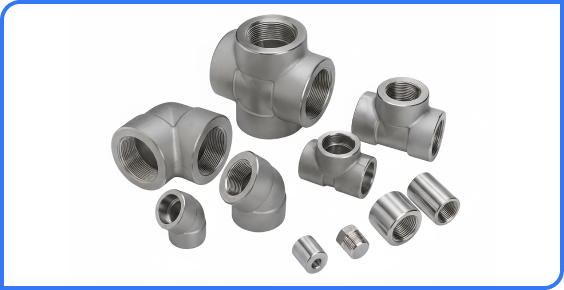Forged Fittings
What are Forged Fittings?
Forged fittings are pipe connectors manufactured through the hot forging process, where metal is shaped under high pressure to achieve exceptional strength, uniformity, and resistance to high-pressure applications.
Available in various types such as elbows, tees, couplings, and unions, forged fittings are typically produced from carbon steel, stainless steel, and alloy steel, and conform to international pressure classes like Class 2000, 3000, and 6000.

Key Features

Leak-Proof
Jointing

Durable
Construction

Easy Installation
& Removal

Wide
Compatibility

Corrosion
Resistant
Specifications
| Specification Category | Parameter / Feature | Details / Options |
|---|---|---|
| Size Range | Nominal Pipe Size (NPS) | ½” to 4” (DN15 – DN100) |
| Pressure Ratings | Class 2000, 3000, 6000, 9000 | |
| PN Ratings | PN20, PN50, PN100 | |
| Fitting Types | Socket Weld Fittings | Elbow (45°, 90°), Tee, Cross, Coupling, Cap, Union |
| Threaded Pipe Fittings | Elbow (45°, 90°), Tee, Cross, Coupling, Union, Plug, Cap, Bushing | |
| Material Options | Stainless Steel | SS 304, SS 304L, SS 316, SS 316L, SS 321 |
| Carbon Steel | ASTM A105, ASTM A350 LF2 | |
| Alloy Steel | ASTM A182 F1, F5, F9, F11, F22, F91 | |
| Duplex & Super Duplex | Duplex 2205, Super Duplex 2507 | |
| Other Materials | Monel 400/K500, Inconel 600/625/825, Nickel 200/201, Titanium (Grade 2, Grade 5) | |
| Standards & Certifications | ASME / ANSI | ASME B16.11 (Socket Weld & Threaded Forged Fittings) |
| ASTM | ASTM A105, ASTM A182, ASTM A350 | |
| European Standards | DIN, EN 10241 | |
| Certifications | ISO 9001, PED 2014/68/EU, NACE MR0175, IBR Approved | |
| Design Features | Wall Thickness | As per ASME B16.11, Schedule 40/80, XXS |
| End Connections | Socket Weld Ends, Threaded Ends (NPT, BSP, BSPT) | |
| Tolerance | As per ASME/ANSI standards | |
| Coating & Surface Finish | Anti-Corrosion Coating | Rust Preventive Oil, Black Oxide |
| Optional Coatings | Hot-Dip Galvanized, Epoxy, PTFE | |
| Surface Finish | Machined, Polished, Passivated | |
| Testing & Inspection | Pressure Testing | Hydrostatic, Pneumatic |
| Non-Destructive Testing | Ultrasonic (UT), Magnetic Particle (MPI), Dye Penetrant (DPT) | |
| Destructive Testing | Tensile, Hardness, Impact |
Dimensions in mm of Forged Screwed Fittings to ANSI B-16. Threaded to ASA B 2.1
| Nom Bore | Pipe OD | 3000 LBS | Common Factors | 6000 LBS | |||||||||||||||
|---|---|---|---|---|---|---|---|---|---|---|---|---|---|---|---|---|---|---|---|
| A | B | C | G | H | K | D | E | F | I | J | L | A | B | C | G | H | K | ||
| 1/8″ | 10.3 | 21 | 22 | 17 | 32 | 16 | 19 | 11 | 10 | 40 | – | 6 | – | 25 | 25 | 19 | 32 | 22 | – |
| 1/4″ | 13.7 | 25 | 25 | 19 | 35 | 19 | 25 | 16 | 11 | 43 | 3 | 6 | 32 | 29 | 33 | 22 | 35 | 25 | 27 |
| 3/8″ | 17.2 | 29 | 33 | 22 | 38 | 22 | 25 | 17.5 | 13 | 48 | 4 | 8 | 38 | 33 | 38 | 25 | 38 | 32 | 27 |
| 1/2″ | 21.3 | 33 | 38 | 25 | 48 | 29 | 32 | 22 | 15 | 51 | 5 | 8 | 46 | 38 | 46 | 29 | 48 | 38 | 33 |
| 3/4″ | 26.7 | 38 | 46 | 29 | 51 | 35 | 37 | 27 | 16 | 57 | 6 | 10 | 51 | 44 | 56 | 33 | 51 | 44 | 38 |
| 1″ | 33.4 | 44 | 56 | 33 | 60 | 44 | 41 | 35 | 19 | 64 | 6 | 10 | 60 | 51 | 62 | 35 | 60 | 57 | 43 |
| 1 1/4″ | 42.2 | 51 | 62 | 35 | 67 | 57 | 44 | 44.5 | 21 | 70 | 7 | 14 | 72 | 60 | 75 | 43 | 67 | 64 | 46 |
| 1 1/2″ | 48.3 | 60 | 75 | 43 | 79 | 64 | 44 | 51 | 21 | 79 | 8 | 16 | 80 | 64 | 84 | 44 | 79 | 76 | 48 |
| 2″ | 60.3 | 64 | 84 | 45 | 86 | 76 | 48 | 63.5 | 22 | 88 | 9 | 17 | 94 | 83 | 102 | 52 | 86 | 92 | 51 |
| 2 1/2″ | 73.02 | 83 | 102 | 52 | 92 | 92 | 60 | 76 | 27 | 118 | 10 | 21 | 122 | 95 | 121 | 64 | 92 | 108 | 64 |
| 3″ | 89.0 | 95 | 121 | 64 | 108 | 108 | 65 | 89 | 29 | 121 | 10 | 25 | 140 | 106 | 146 | 79 | 108 | 127 | 68 |
| 4″ | 114.5 | 114 | 152 | 79 | 121 | 140 | 68 | 117.5 | 32 | 150 | 13 | 25 | 180 | 114 | 152 | 79 | 121 | 159 | 75 |
Dimensions of Socket Weld Fitting to ANSI B-16.11
| Nom Bore | Pipe O.D. | 3000 LBS | Common Factors | 6000 LBS | |||||||||||||||
|---|---|---|---|---|---|---|---|---|---|---|---|---|---|---|---|---|---|---|---|
| A | B | K | J | L | M | N | P | Q | C min | D min | O min | O max | A | B | M | K | N | ||
| 1/8″ | 10.3 | 22 | 18.5 | 26 | 16 | 40 | 17.3 | 32 | 17.5 | 10 | 10.7 | 10 | 5 | 8 | 22 | 22 | 20 | 25 | 46 |
| 1/4″ | 13.7 | 22 | 22 | 26 | 18 | 43 | 21.2 | 32 | 17.5 | 10 | 14.1 | 10 | 5 | 8 | 27 | 25 | 24 | 25 | 51 |
| 3/8″ | 17.2 | 25 | 25 | 26 | 19 | 48 | 25.4 | 36 | 19 | 10 | 17.6 | 10 | 3 | 9 | 27 | 28 | 28 | 26 | 60 |
| 1/2″ | 21.3 | 27 | 32 | 30 | 21 | 51 | 31 | 43 | 22 | 10 | 21.7 | 10 | 6 | 13 | 31 | 34 | 34 | 31 | 72 |
| 3/4″ | 26.7 | 34 | 38 | 32 | 24 | 57 | 37 | 50 | 25 | 13 | 27 | 13 | 6 | 13 | 37 | 42 | 41 | 35 | 80 |
| 1″ | 33.4 | 37 | 46 | 40 | 25 | 64 | 45.2 | 60 | 27 | 13 | 33.8 | 13 | 9 | 17 | 42 | 50 | 50 | 42 | 94 |
| 1 1/4″ | 42.2 | 42 | 56 | 40 | 29 | 70 | 55 | 70 | 30 | 13 | 42.6 | 13 | 9 | 17 | 47 | 59 | 58 | 41 | 100 |
| 1 1/2″ | 48.3 | 48 | 62 | 40 | 30 | 79 | 61.4 | 78 | 32 | 13 | 48.7 | 13 | 9 | 17 | 53 | 67 | 55 | 43 | 122 |
| 2″ | 60.3 | 56 | 75 | 52 | 37 | 89 | 75 | 95 | 38 | 13 | 61.2 | 16 | 15 | 23 | 59 | 84 | 83 | 55 | – |
| 2 1/2″ | 73.02 | 60 | 92 | 52 | 48 | 114 | 91.3 | 125 | 38 | 16 | 73.8 | 16 | 14 | 24 | 102 | – | – | 56 | – |
| 3″ | 89.0 | 76 | 110.8 | 52 | 51 | 127 | 108.8 | 140 | 44 | 16 | 89.6 | 16 | 14 | 24 | 121 | – | – | 58 | – |
| 4″ | 114.5 | 88 | 137.5 | 58 | – | 150 | 136.9 | – | 48 | 19 | 115.5 | 19 | 14 | 24 | 152 | – | – | 64 | – |
Mechanical Properties of Forged Fittings
| Property | Value | Unit / Standard |
|---|---|---|
| Tensile Strength | 485 – 850 | MPa (varies with material: CS, SS 304/316, Alloy Steel) |
| Yield Strength | 250 – 600 | MPa |
| Hardness | 130 – 220 | HB (Brinell) |
| Elongation | ≥ 20 – 35 | % |
| Density | 7.8 – 8.0 | g/cm³ |
| Impact Toughness | ≥ 27 – 70 | J (Charpy, grade-dependent) |
| Modulus of Elasticity (E) | ~200 | GPa |
| Fatigue Strength | 220 – 450 | MPa |
| Corrosion Resistance | Good to Excellent (higher in SS/Alloy grades) | – |
| Thermal Conductivity | 15 – 50 | W/m·K |
| Coefficient of Thermal Expansion | 11 – 17 ×10⁻⁶ | /°C |
| Yield Ratio (YS/UTS) | 0.45 – 0.65 | – |
| Poisson’s Ratio | 0.27 – 0.30 | – |
| Brinell Hardness Range | 130 – 220 | HB |
| Surface Finish | Machined, Black oxide, Pickled & Passivated (for SS) | – |
| Operating Temperature Range | -46 to 600 | °C (material-dependent) |
| Pressure Rating | Class 2000, 3000, 6000 | ASME B16.11 Standards |
Chemical Composition of Forged Fittings
| Element | SS 304 | SS 304L | SS 316 | SS 316L |
|---|---|---|---|---|
| Chromium (Cr) | 18.0 – 20.0 | 18.0 – 20.0 | 16.0 – 18.0 | 16.0 – 18.0 |
| Nickel (Ni) | 8.0 – 10.5 | 8.0 – 12.0 | 10.0 – 14.0 | 10.0 – 14.0 |
| Carbon (C) | ≤ 0.08 | ≤ 0.03 | ≤ 0.08 | ≤ 0.03 |
| Manganese (Mn) | ≤ 2.00 | ≤ 2.00 | ≤ 2.00 | ≤ 2.00 |
| Silicon (Si) | ≤ 1.00 | ≤ 1.00 | ≤ 1.00 | ≤ 1.00 |
| Phosphorus (P) | ≤ 0.045 | ≤ 0.045 | ≤ 0.045 | ≤ 0.045 |
| Sulfur (S) | ≤ 0.030 | ≤ 0.030 | ≤ 0.030 | ≤ 0.030 |
| Iron (Fe) | Balance | Balance | Balance | Balance |
| Molybdenum (Mo) | — | — | 2.0 – 3.0 | 2.0 – 3.0 |
Do you have questions?
Forged fittings have a denser grain structure, making them stronger and more impact-resistant than cast fittings—especially under pressure.
Yes. Their compact structure and secure connections make them ideal for underground lines, vibration-prone systems, and mobile units.
Socket weld fittings offer better sealing and strength, while threaded pipe fittings are easier to install and dismantle. Choice depends on pressure class and maintenance access.
Absolutely. We provide Mill Test Certificates (MTCs) and TPI approvals (SGS, BV, TUV) as per customer requirements.


